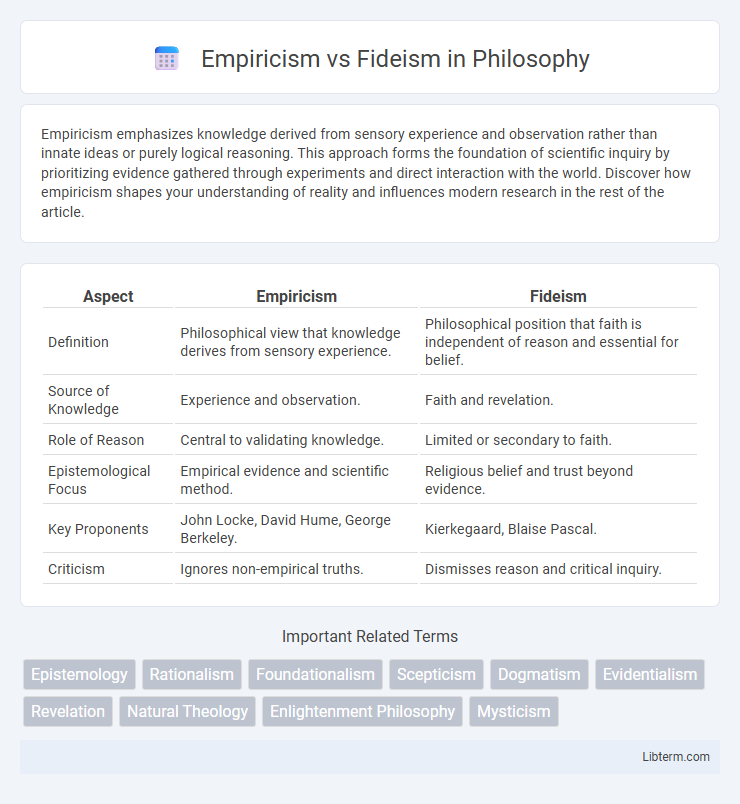Empiricism emphasizes knowledge derived from sensory experience and observation rather than innate ideas or purely logical reasoning. This approach forms the foundation of scientific inquiry by prioritizing evidence gathered through experiments and direct interaction with the world. Discover how empiricism shapes your understanding of reality and influences modern research in the rest of the article.
Table of Comparison
| Aspect | Empiricism | Fideism |
|---|---|---|
| Definition | Philosophical view that knowledge derives from sensory experience. | Philosophical position that faith is independent of reason and essential for belief. |
| Source of Knowledge | Experience and observation. | Faith and revelation. |
| Role of Reason | Central to validating knowledge. | Limited or secondary to faith. |
| Epistemological Focus | Empirical evidence and scientific method. | Religious belief and trust beyond evidence. |
| Key Proponents | John Locke, David Hume, George Berkeley. | Kierkegaard, Blaise Pascal. |
| Criticism | Ignores non-empirical truths. | Dismisses reason and critical inquiry. |
Introduction to Empiricism and Fideism
Empiricism is a philosophical approach that emphasizes knowledge derived from sensory experience and evidence gathered through observation and experimentation. Fideism asserts that faith, rather than reason or empirical evidence, is the primary basis for belief, particularly in religious contexts. These contrasting epistemologies highlight the tension between evidence-based understanding and faith-based acceptance in the pursuit of truth.
Historical Origins and Key Philosophers
Empiricism, rooted in the 17th-century Scientific Revolution, emphasizes knowledge through sensory experience, championed by philosophers like John Locke, George Berkeley, and David Hume. Fideism, tracing back to early Christian thinkers such as Tertullian and Blaise Pascal, asserts that faith is independent of reason and essential for understanding spiritual truths. The historical debate between these schools reflects the tension between evidence-based knowledge and belief-based conviction in Western philosophy.
Core Principles of Empiricism
Empiricism emphasizes knowledge derived from sensory experience and observable evidence, grounding truth in empirical data and experimentation. It rejects innate ideas, arguing that the mind begins as a blank slate shaped through interaction with the environment. Core principles include reliance on perception, verification through experience, and skepticism toward claims lacking empirical support.
Fundamental Tenets of Fideism
Fideism asserts that faith is the primary means to attain religious knowledge, emphasizing belief without reliance on empirical evidence or rational proof. It holds that reason and sensory experience are insufficient for understanding divine truths, positioning faith as a distinct and superior epistemic pathway. This fundamental tenet contrasts sharply with empiricism, which prioritizes observation and evidence as the basis for knowledge acquisition.
Epistemological Differences Explained
Empiricism emphasizes knowledge acquisition through sensory experience and evidence, relying on observation and experimentation to validate beliefs. Fideism asserts that faith is the primary source of knowledge, holding that certain truths are accessible only by faith rather than reason or empirical evidence. This epistemological divergence centers on the nature and limits of human knowledge, with empiricism prioritizing empirical verification and fideism upholding the necessity of faith for understanding metaphysical or religious claims.
Rationality and Faith: Points of Tension
Empiricism emphasizes knowledge derived from sensory experience and rational analysis, asserting that evidence and logic form the basis of understanding reality. Fideism posits that faith transcends reason, maintaining that religious beliefs rely on spiritual conviction rather than empirical proof. The tension between rationality and faith arises as empiricism demands verifiable data, while fideism upholds belief in the unseen, leading to fundamental disagreements on epistemological authority.
Empiricism in Science and Everyday Reasoning
Empiricism emphasizes knowledge derived from sensory experience and observation, forming the foundation of the scientific method through hypothesis testing and experimental verification. In everyday reasoning, empiricism encourages reliance on evidence and experience instead of intuition or tradition, promoting critical thinking and rational decision-making. This approach underpins advances in technology, medicine, and education by continually refining understanding based on empirical data.
Fideism’s Role in Religion and Spirituality
Fideism emphasizes faith as the primary means of acquiring religious knowledge, rejecting the necessity of empirical evidence or rational justification. This approach supports the belief that spiritual truths transcend human reason and are accessible only through personal faith or divine revelation. In many religious traditions, fideism validates the experiential and mystical aspects of spirituality that empirical methods cannot quantify or explain.
Strengths and Critiques of Both Perspectives
Empiricism excels in grounding knowledge through sensory experience and scientific observation, promoting verifiable and testable claims, but faces criticism for potentially disregarding metaphysical or spiritual truths beyond empirical evidence. Fideism emphasizes faith as a primary source of knowledge, offering strength in addressing existential and moral questions that empirical methods may not reach, yet it is critiqued for relying on belief without requiring rational justification or empirical support. Both perspectives highlight the tension between evidence-based knowledge and faith-based conviction, underscoring ongoing debates in epistemology about the limits and sources of human understanding.
Bridging Empiricism and Fideism: Is Reconciliation Possible?
Bridging empiricism and fideism involves exploring whether sensory experience and faith-based belief can coexist without contradiction. Philosophers like William James and Alvin Plantinga argue that empirical evidence and religious faith address different domains--empiricism governs empirical facts, whereas fideism concerns metaphysical or spiritual truths. This suggests reconciliation is possible through a complementary framework where empirical methods inform natural phenomena, and fideistic beliefs guide moral and existential questions.
Empiricism Infographic

 libterm.com
libterm.com